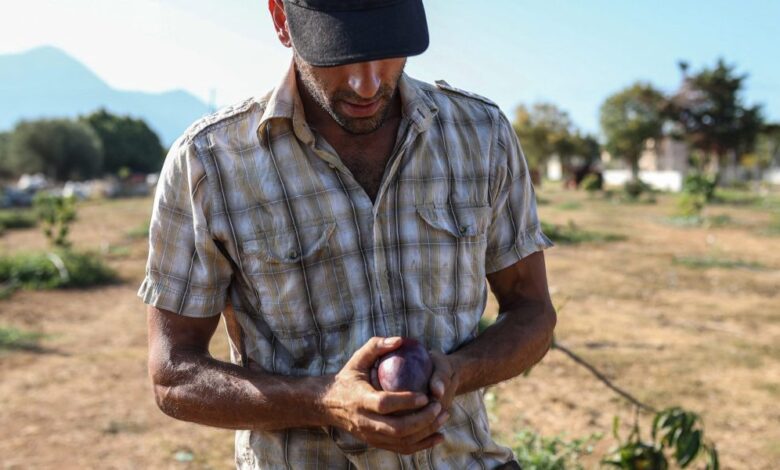Mango farming in Greece is the latest experiment in bizarre climate change as drought becomes the norm


While stirring the leaves of a bush on his farm in Kyparissia, western Greece, Panos Adamopoulos saw the first mangoes about to ripen — part of his experiment to combat climate change.
“Right there!” he cried.
For decades, this fertile land on the Ionian coast was known primarily for its olive trees, alongside watermelons and other crops.
But even this part of Greece, which gets more rain than the rest of the country, is struggling with the consequences of drought.
After its warmest winter on record, Greece also experienced its warmest June and July since reliable data began to be collected in 1960.
“There is no winter,” Adamopoulos, 38, told AFP, adding that his property had not had a drop of rain since March.
“No water, no farming,” said the farmer, whose crops seemed to grow straight out into the Ionian Sea.
The majority of Adamopoulos’ current income comes from iceberg lettuce.
But as the dry season approaches, he may soon have to abandon some profitable but water-intensive crops like watermelon.
Adamopoulos is one of the few growers in Greece switching to tropical fruits—mangoes, avocados, lychees, cherimoyas and macadamia nuts—which he says are “more resilient” to the increasingly intense heat of the Mediterranean.
Currently, he grows only a few dozen mango and avocado trees on his 80-hectare (198-acre) plot.
The exotic fruits have adapted so well to their new surroundings that Adamopoulos now plans to plant another 300 trees. He said he has already received orders for his first harvest, expected later this month.
The initiative is part of research by Greece’s state agricultural institute Demeter to determine whether tropical fruits can help solve the country’s looming drought problem.
Not a magic solution
The aim is to “find new ways to deal with this climate change and make it work for us,” said study supervisor Teresa Tzatzani.
“The weather is hotter all year round now and that’s good for these crops,” she said.
Although avocado trees have grown on the island of Crete, scientists are still uncertain whether the tree has adapted to conditions on mainland Greece.
Tzatzani notes that while mango trees require very little rain, the past two winters have been unusually dry.
Antonis Paraskevopoulos, head of agriculture for the Triphylia region, said this kind of innovation was essential to save the sector from future climate disasters.
But for now, tropical fruits are not a miracle solution.
The program currently has only about a dozen farmers participating and about 10 hectares of land under cultivation.
Tzatzani, who plans to expand the experiment to other parts of Greece, said that while it is not intended to replace staple local products such as olives or oranges, it could serve as a supplement.
Neighboring countries are facing similar problems. In Italy, Sicilian farmers have started producing mangoes, bananas and papayas.
The Intergovernmental Panel on Climate Change (IPCC) estimates that the Mediterranean basin, one of the “hotspots” of climate change, will experience more frequent heatwaves and droughts.
A ‘bad year’?
Theodoros Dimitrakakis, another Greek farmer involved in the initiative, estimates that it will take many years for tropical fruit production to become profitable in Greece.
Although excited about the experiment, the 34-year-old said he could not afford to devote all his time to it, as his main source of income, olive trees, required his full attention.
His village, like many others in Greece, is often without water for hours a day due to scheduled water cuts.
Dimitrakakis said last year his olive yield was 60 percent below average.
Despite being an environmental activist during his college years, Dimitrakakis admits that he only recently realized that climate change would soon impact him so much.
Now he hopes to convince other local farmers, some of whom like to think this is just a “bad year.”




